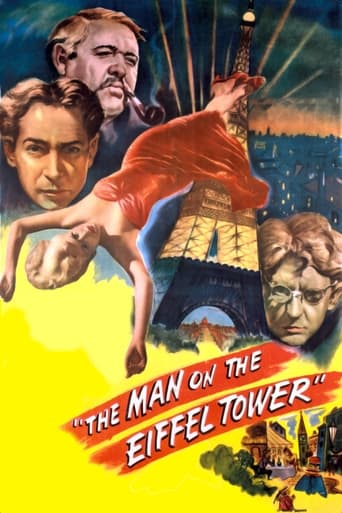Rainey Dawn
This film is a bit of a maze to watch - it does take some twists and turn and some of leads the police to a dead end while other paths leads to the killer. Exciting to watch.Bill Kirby (Hutton) is a married man but falls for his wife's best friend, he also has a rich aunt that is the victim of murder along with her maid. Joseph Heurtin (Meredith) is a man that set up to take the rap for the double murder. Inspector Jules Maigret (Laughton) is out to get the real killer Johann Radek (Tone). The Eiffel Tower will take center stage quite often in this film - in particular the climax of the movie.Worth watching if you like dirty, gritty crime films and a few twists that keep the movie very interesting.8/10
Martin Bradley
A real curio but a terrible film. For years it was thought that "The Man on the Eiffel Tower" was lost until two worn out copies were discovered and restored, after a fashion, by UCLA. It's based on a Georges Simenon Maigret novel and was filmed on location in post-war Paris by Burgess Meredith on Ansco Reversal Film, no original elements of which exist today, (the location work is terrific, the color process considerably less so).Meredith also appears as the prime suspect in a double murder that Charles Laughton's Maigret is investigating. The real killer, however, is psychopathic Franchot Tone. Both he and Meredith look very uncomfortable in their roles though Laughton is excellent and comes close to redeeming the picture, (close but not close enough). The real star, of course, is Paris and its number one tourist attraction which features prominently in the films climax. Of historical interest, then but hardly worth seeing.
Richard Burin
The Man on the Eiffel Tower (Burgess Meredith, 1949) is really, really odd, perhaps due to the troubled production, with Irving Allen replaced by Meredith and future Night of the Hunter director Charles Laughton taking charge of the scenes featuring his co-star. The story is fragmented and the direction wildly erratic - sometimes vividly expressionistic, at other times consisting of the cast simply standing in a big line - but at least we've got a restored copy now. Previous touring prints had degraded to such an extent that they had turned sepia, except for Meredith's bright red hair. The plot sees manic depressive Franchot Tone - yes, apparently bipolar disorder is the same as megalomania if you've got it not only in your heart, but "also up here" (I have no idea) - repeatedly taunting useless detective Inspector Maigret (Laughton) en route to a climactic confrontation up Le Tour Eiffel. Laughton is lacklustre, Meredith peculiar and Tone looks about 108 - his grey hair dyed chestnut - though he's quite effective in a one-note role. English leading lady Patricia Roc is also among the bafflingly illustrious cast, but she's given virtually nothing to do. The real star is the Ansco Color photography (unsung MGM masterpieces Kiss Me Kate and Brigadoon were two one of the few other films shot in the short-lived process) shot at sites around Paris, from the banks of the Seine to Les Deux Magots (an old haunt of Hemingway's) and the eponymous monument.
captainzip
I wonder what this film would have been like had Burgess Meredith not taken over directing from Irving Allen. I showed my Super 8 print of it to a packed house of two recently - to rediscover that it is a gripping detective mystery moving at a rapid and entertaining pace.While not flawless (dialogue is delivered in a very perfunctory and unimaginative way occasionally), it is well worth a peek with some great Paris location work, some initial intrigue over who had actually committed murder, and a battle of nerves between Inspector Maigret and the manic-depressive Johann Radek character.The scene where the Tzigane band intrude on the café conversation just too much is fun.But, if for no other reason, it should be seen for its gripping, death-defying climactic suicidal climb on the Eiffel Tower and Burgess Meredith's fall onto the power cables.I'd love to see the restored Ansco-color version which showed at the National Film Theatre a year or two ago.



